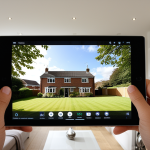Overview of Technology in UK Patient Care
Technology plays an indispensable role in modern healthcare, especially within the United Kingdom, where digital health innovations are revolutionizing patient outcomes. At its core, technology in healthcare encompasses a wide range of tools and systems designed to enhance patient care, improve efficiencies, and facilitate better health management.
The integration of technology into UK patient care has a storied history, tracing back to initial electronic advancements in the mid-20th century. Over the decades, the adoption of such technologies has accelerated, driven by the need to improve patient outcomes and healthcare efficiency. This encompasses everything from simple digital record-keeping systems to sophisticated diagnostic machines.
Topic to read : What innovative strategies are being implemented in UK healthcare?
The importance of technology in healthcare cannot be overstated. By leveraging digital health innovations, healthcare providers are now equipped to address challenges such as long wait times, inadequate patient engagement, and the need for personalized care. Additionally, these advancements are pivotal in ensuring improved patient outcomes through more accurate diagnoses and effective treatment plans. As the landscape of health technology continues to evolve, the focus remains on the patient—ensuring that every technological advance is geared towards enhancing their experience and improving overall health metrics.
Major Technologies Transforming Patient Care
In today’s rapidly advancing world, several major technologies are reshaping the landscape of patient care. Among these, telemedicine, electronic health records (EHR), and artificial intelligence (AI) play pivotal roles in transforming how healthcare is delivered and experienced in the UK.
In the same genre : What Are the Future Challenges for Healthcare Systems in the UK?
Telemedicine
Telemedicine refers to the use of digital platforms to provide remote clinical services, expanding healthcare accessibility. By eliminating geographical barriers, patients now receive consultations from the comfort of their homes, significantly enhancing convenience. Studies indicate that telehealth services contribute to improved patient outcomes, as they facilitate timely interventions and consistent medical monitoring.
Electronic Health Records (EHR)
Electronic Health Records serve as digital repositories for patient information, crucial for effective patient management. EHRs enable seamless data sharing among healthcare providers, enhancing collaboration and care coordination. Evidence shows that EHR implementation reduces medical errors significantly, attributed to streamlined access to comprehensive patient histories and real-time data updates.
Artificial Intelligence (AI)
AI’s role in healthcare extends to sophisticated diagnostic capabilities and tailored treatment planning. AI algorithms analyze vast datasets, supporting clinicians with precise diagnoses and personalized treatment recommendations. In the UK, case studies highlight AI’s success in enhancing early detection of diseases and optimizing therapeutic outcomes. However, the integration of AI also raises ethical considerations, particularly around patient data privacy and decision-making transparency. While AI offers immense benefits, its deployment in patient care necessitates careful ethical oversight to maintain trust and integrity.
Benefits of Technology in Patient Care
The incorporation of technology in healthcare has revolutionized patient care, leading to improved patient outcomes and greater healthcare efficiency. At the forefront is the enhanced accuracy in diagnostics and treatment. By utilizing cutting-edge tools and systems, healthcare providers can offer more precise assessments, thereby increasing treatment effectiveness and reducing the likelihood of errors.
Moreover, technology plays a significant role in minimizing patient wait times and reducing hospital congestion. With digital advancements such as electronic queuing systems and telehealth consultations, patients experience less time in waiting rooms, thereby fostering a more efficient healthcare environment. This efficiency not only benefits the healthcare system but also enhances patient satisfaction by providing quicker access to necessary care.
Furthermore, patient engagement has seen a noticeable increase through the use of digital tools. Patients now have easier access to their health information, can schedule appointments online, and receive digital reminders for medication and follow-up visits. This increased accessibility and engagement empower patients to take an active role in their health management, contributing to overall positive outcomes.
Challenges of Implementing Technology in UK Patient Care
Implementing healthcare technology in the UK presents various challenges, with data privacy concerns and regulatory compliance being primary obstacles. Ensuring that patient data remains confidential is critical, as breaches can lead to a loss of trust and potential legal repercussions. Healthcare providers must navigate regulatory hurdles, such as adhering to the General Data Protection Regulation (GDPR) standards, which govern the processing of personal data.
Patient consent issues further complicate technology integration. Patients must be informed about how their data will be used, requiring clear communication and consent protocols. Additionally, integrating new technologies with existing systems often poses significant challenges. Legacy infrastructure may not be compatible with cutting-edge solutions, necessitating costly upgrades or comprehensive overhauls.
Data security is another major concern. As digital systems become more widespread, the risk of cyberattacks increases, threatening the security of sensitive patient information. Healthcare institutions must invest in robust cybersecurity measures to safeguard against these threats.
In summary, while technology offers vast potential for improving patient care, the journey to seamless integration is fraught with challenges. Addressing these barriers requires careful planning, adherence to regulations, and ongoing dialogue between stakeholders to ensure that advancements in technology translate into tangible benefits for patients and providers alike.
Expert Opinions and Case Studies
In understanding the full potential of healthcare innovations in the UK, insights from professionals offer invaluable perspectives. Experts consistently highlight that technological impacts have brought about remarkable changes in patient care processes. For instance, Dr. James Field, a consultant oncologist, emphasizes that the digitalization of health records and the integration of AI have streamlined workflows, significantly reducing administrative burdens while enhancing diagnostic accuracy.
Successful implementation stories underscore the broad potential of technology. The Royal Free London NHS Foundation Trust has made waves with its AI systems designed to predict patient deterioration, showcasing a tangible example of technology’s power in healthcare. These AI-driven systems have been lauded for their ability to provide timely interventions, thereby contributing to improved patient outcomes.
Moreover, a study at the University of Oxford investigated telemedicine’s role in chronic disease management. The findings revealed substantial increases in patient engagement and satisfaction, reinforcing the practicality of remote care solutions. By increasing accessibility and reducing the need for frequent in-person visits, telehealth services have emerged as essential components of modern healthcare delivery.
As technological advancements continue, ongoing research prioritizes evaluating long-term impacts on patient outcomes. These studies aim to refine existing systems and innovate further, ensuring that every digital health innovation serves to improve care quality and efficiency.
Future of Technology in UK Patient Care
The future trends of technology in UK patient care suggest a transformative evolution, set to redefine healthcare landscapes. With emerging technology advancements, innovations like genomics, wearable health tech, and advanced robotics are anticipated to further elevate patient outcomes. Genomics, for instance, offers personalized treatment options through genetic mapping, enabling healthcare providers to craft precise and personalized therapeutic strategies.
Predictably, technology’s evolving role will continue to empower patients, providing them with tools to manage their health actively. Wearable technology, such as smartwatches and biosensors, promises to revolutionize patient monitoring, offering real-time data that aids in proactive healthcare management.
However, as with any progress, regulatory changes may significantly influence technology implementation. It’s expected that evolving healthcare policies will focus on safeguarding ethical use and maintaining patient privacy amidst rapid technological integration. Compliance with stringent regulations may encourage the development of more secure, patient-centric systems. As the balance between innovation and regulation evolves, UK healthcare must remain adaptable to harness the full potential of technology while ensuring patient trust and safety.










